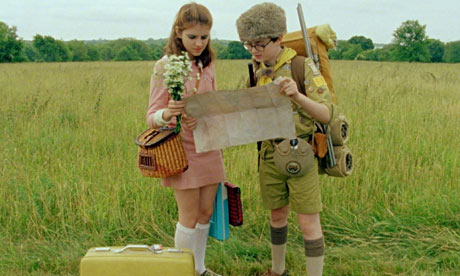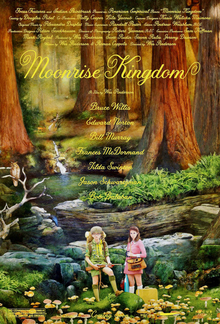His latest film, Moonrise Kingdom, is a purely nostalgic coming-of-story set in a New England island in which Sam Shukusky (Jared Gilman), a Khaki scout with a possible dark side and alienation, meets Suzy (Kara Hayward), who lives with a dysfunctional family with her lawyer parents (Frances McDormand and Bill Murray). They meet in a play dedicated to Benjamin Britten's music and made a pact to reunite during the summer of 1965 and run away on a beach from their respective camp, so their parents and the whole Khaki Troop, led by Scout Master Ward (Edward Norton) and organized by Bruce Willis, as a search party to find them.
People have argued that Anderson's creativity and the fact that the rest of his filmography follows every attribute that he introduced in Bottle Rocket and strengthened in Rushmore has been good and bad at the same time, hence the director easily fitting into the auteur theory. That wouldn't be my beef with the filmmaker because it's basically one about progress, but my problem though is perhaps the tone of each of his films. I've never been a huge fan of Wes Anderson to begin with. Sure, there's a lot to appreciate what he presents on-screen, but unfortunately I've never embraced it. Not that he doesn't want me to or I choose to. However, the biggest issue with much of his films is perhaps their dry tone. Anderson has a deadpan sense of humor and it is placed in between the blunders in family dynasties and the toyetic, arch and imaginative bits that made him the pinpoint of everything indie. Unfortunately for me, this goes into the way of any possible emotional resonance and forcefully remind the audience each character's flaws giving us less chance to connect with the film as a whole. Quite put in simple terms, his movie becomes less interesting.
That said much of the dry humor are apparent in Moonrise Kingdom and has all of the features in framing used in his previous films, but it wasn't so much as a complaint, which I'll get to later. This film delivers much of his expected visuals. His rapid camera movement, the use of many aerial shots of particular objects that becomes important to the events of the film and his cinematography worked on by frequent collaborate Robert Yeoman in which he puts in shades of yellow and green as his main color pallette. However the cinematography is much more engaging as the setting and the entire mis-en-scene resembles a well-crafted oil painting. This is perhaps Anderson's most enegetic film, in terms of narrative and visuals combined, given how well and fast paced the film was and the music from Benjamin Britten and the score from Alexandre Desprat serves the film so well. E.g. - the score fits perfectly in a scene where Sam is caught by the Khaki troop and defeats all of them. Once the film takes a break, we get some much needed emotional framing of each character especially with Sam and Scout Master Ward, who contains an isolated emptiness and empty awareness of the consequence. There's also a wonderful shot in which Suzy's house is given the dollhouse treatment in which we see almost every detail of the place.
The acting is perhaps exceptional, though not including some of the cast. Jared Gillman and Kara Hayward are believable and interesting as Sam and Suzy, the Romeo and Juliet-styled lovers running away from their empty families (despite the fact Sam is an orphan, he is taken care of by foster parents). Their chemistry together carries this strange coming-of-age story into a journey filled with much whimsy and much insight on their benevolent personalities. And I haven't this much bonding between two children carry this much of the film since Let the Right One In. The adults though are mixed. Edward Norton does a noticeable job as Troop Master Ward and so does Bruce Willis who plays the local police officer. They are both interesting, not in that they are also pressed down from self-alienation (as of every Wes Anderson's film), but they are perhaps the only people much caring of the two children, particularly with Sam who have no where to go. Even Tilda Swinton, who plays the woman of Social Services, contain some trait of Nurse Ratched in which she wants to put Sam into custody that brings some tension between the characters.
Bill Murray and Frances McDormand, who plays Suzy's parents are perhaps the glaring distraction for me in the film. As I mentioned before, my grievance with any of Wes's films is his deadpan humor and he does it with every character and the worst of it is Murray. Part of which always disappoints me about the director and actor working together is that Murray is never given anything interesting to do or utilize his talents that we've known him for during the 1980s. So his presence just wears the film down. Or any of Anderson's films at least, worst of which was Life Aquatic. I wouldn't think Murray would be vitally important during the movie, but for most people, he becomes increasingly much bland and boring. Another distraction is Bob Balaban who serves as the narrator. I don't think he is any good of a voiceover nor he is good in bringing any self-referential or meta humor of the film's intent, but whenever present, it feels way too odd and awkward, even in a movie directed by Wes Anderson.
Anyway, Moonrise Kingdom continues as one of his enjoyable films starting from The Darjeeling Limited and Fantastic Mr. Fox. It could've started in the era of The Royal Tenanbaums, but that film wasn't as genuine and light hearted as I wanted to be. This is the same style he puts into it, but the more I think about it within this movie, the less it bothered me. It is a connecting, idiosyncratic coming-of-age story that contains various barriers of what Anderson plays out in his film. Unfortunately though, if you can't stand him, you won't like this film. Your attitude towards him is close to deciding whether or not you want to buy a house that involves the color of the wall and is the key to how you decide. Moonrise Kingdom is not the gem everybody has been speculating but its nonetheless fascinating into the mind of the auteur.
That said much of the dry humor are apparent in Moonrise Kingdom and has all of the features in framing used in his previous films, but it wasn't so much as a complaint, which I'll get to later. This film delivers much of his expected visuals. His rapid camera movement, the use of many aerial shots of particular objects that becomes important to the events of the film and his cinematography worked on by frequent collaborate Robert Yeoman in which he puts in shades of yellow and green as his main color pallette. However the cinematography is much more engaging as the setting and the entire mis-en-scene resembles a well-crafted oil painting. This is perhaps Anderson's most enegetic film, in terms of narrative and visuals combined, given how well and fast paced the film was and the music from Benjamin Britten and the score from Alexandre Desprat serves the film so well. E.g. - the score fits perfectly in a scene where Sam is caught by the Khaki troop and defeats all of them. Once the film takes a break, we get some much needed emotional framing of each character especially with Sam and Scout Master Ward, who contains an isolated emptiness and empty awareness of the consequence. There's also a wonderful shot in which Suzy's house is given the dollhouse treatment in which we see almost every detail of the place.
 |
| Photo (c) The Guardian |
Bill Murray and Frances McDormand, who plays Suzy's parents are perhaps the glaring distraction for me in the film. As I mentioned before, my grievance with any of Wes's films is his deadpan humor and he does it with every character and the worst of it is Murray. Part of which always disappoints me about the director and actor working together is that Murray is never given anything interesting to do or utilize his talents that we've known him for during the 1980s. So his presence just wears the film down. Or any of Anderson's films at least, worst of which was Life Aquatic. I wouldn't think Murray would be vitally important during the movie, but for most people, he becomes increasingly much bland and boring. Another distraction is Bob Balaban who serves as the narrator. I don't think he is any good of a voiceover nor he is good in bringing any self-referential or meta humor of the film's intent, but whenever present, it feels way too odd and awkward, even in a movie directed by Wes Anderson.
Anyway, Moonrise Kingdom continues as one of his enjoyable films starting from The Darjeeling Limited and Fantastic Mr. Fox. It could've started in the era of The Royal Tenanbaums, but that film wasn't as genuine and light hearted as I wanted to be. This is the same style he puts into it, but the more I think about it within this movie, the less it bothered me. It is a connecting, idiosyncratic coming-of-age story that contains various barriers of what Anderson plays out in his film. Unfortunately though, if you can't stand him, you won't like this film. Your attitude towards him is close to deciding whether or not you want to buy a house that involves the color of the wall and is the key to how you decide. Moonrise Kingdom is not the gem everybody has been speculating but its nonetheless fascinating into the mind of the auteur.

No comments:
Post a Comment